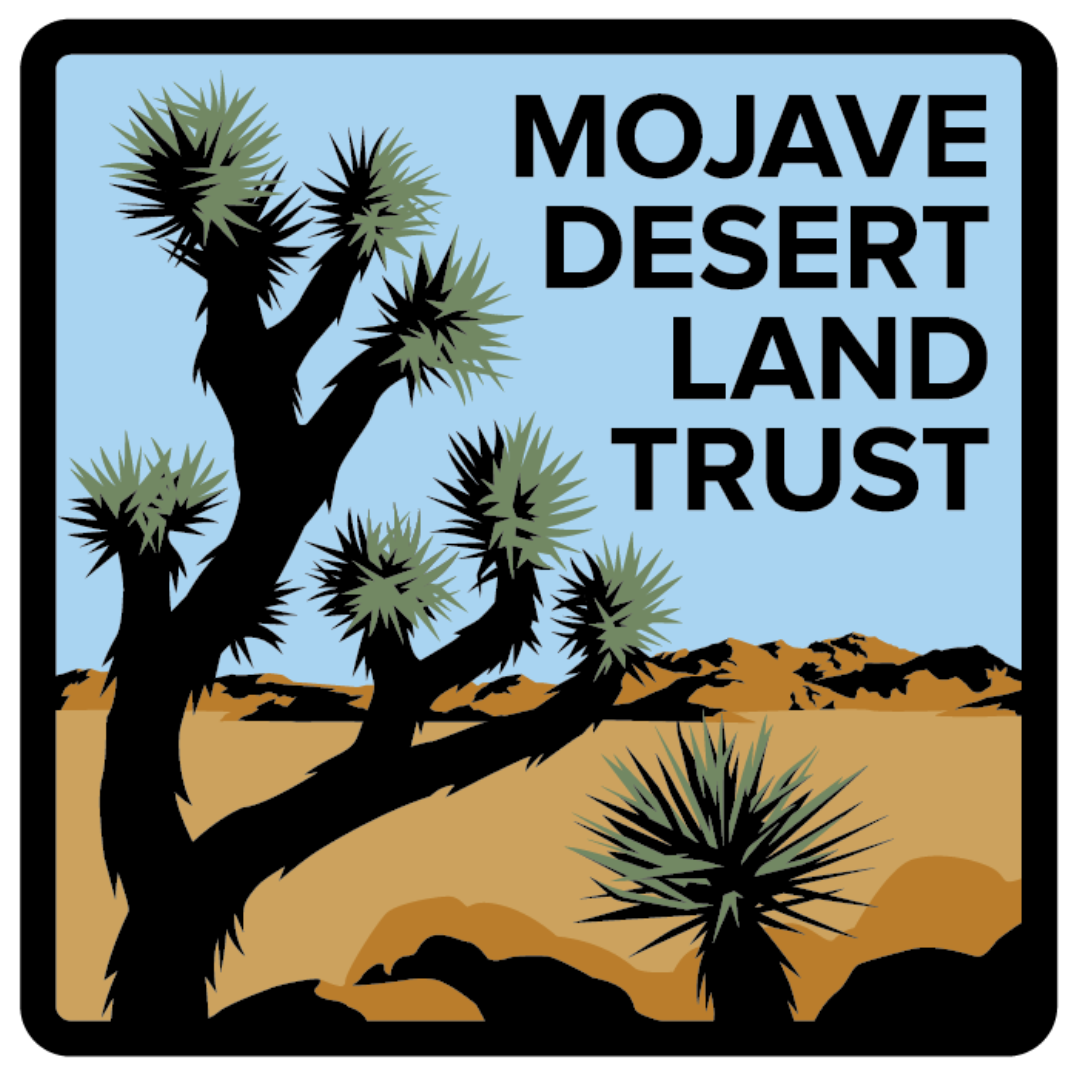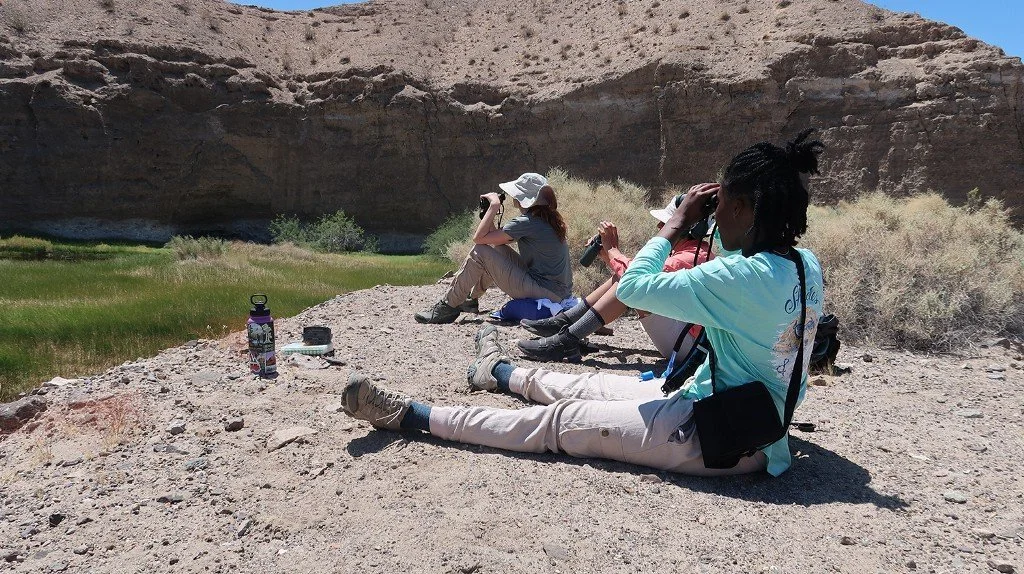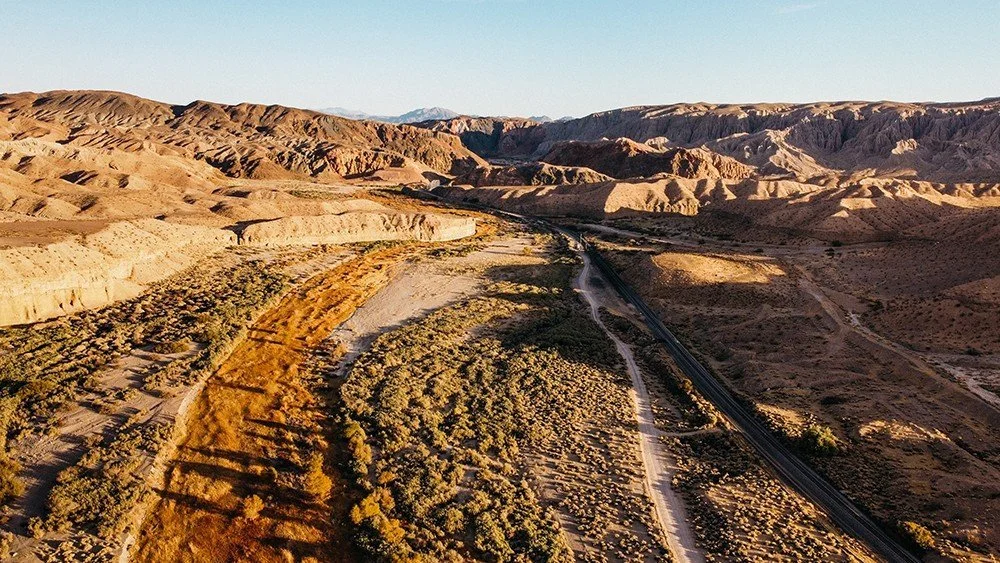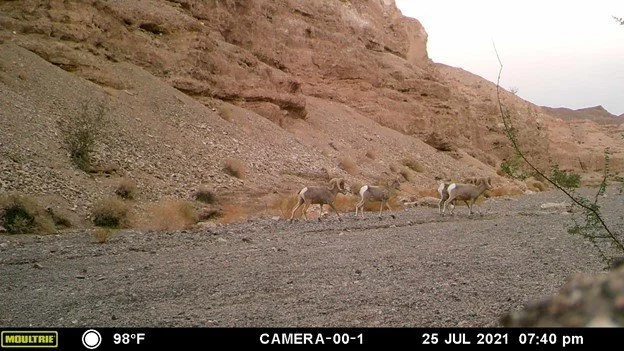Researchers help identify Mojave summer bird population
Birdwatching interns with the Women In Science Discovering Our Mojave program have closed a gap in the data about avian species in Mojave Trails National Monument.
(L-R) Interns Giselle Sandoval, Ali Kalinowski, and Leah Thomas. Photo: Mary Cook-Rhyne
By Mary Cook-Rhyne, MDLT Education Coordinator and Women in Science Discovering Our Mojave (WISDOM) program managerA quick glance at the eBird citizen science application and website shows the incredible diversity of avian species within one area of the Mojave Desert. Just 45 minutes east of Barstow, Afton Canyon Natural Area is one of the few locations where the Mojave River flows above ground year-round, providing a rare water source for wildlife in summer.
Aerial view of Afton Canyon. Photo: Global Eyes Media
A gap in the citizen science data about resident and migratory birds in the canyon at the hottest time of the year has now been filled thanks to research by interns with the Women In Science Discovering Our Mojave program. Afton Canyon Natural Area is located within the boundary of Mojave Trails National Monument, which spans a whopping 1.6 million acres of public land and is the largest monument in the contiguous United States. It is managed by the Bureau of Land Management to ensure the biological diversity of the landscape while protecting recreational and traditional uses of the land. Mojave Trails contains natural features like basalt mountain ranges, volcanic plugs, sand dunes, wilderness areas, beautiful open vistas, and significant cultural and historic sites. Interns with the WISDOM program have been carrying out research in Afton Canyon since 2019, with a focus in the past on bighorn sheep and the tamarisk beetle populations.
In a new project, interns Giselle Sandoval, Leah Thomas, and Ali Kalinowski set out to collect data about avian species over the course of six months. In the summer months, temperature averages 100 degrees Fahrenheit during the day in the canyon. These temperatures typically drive away visitors who would otherwise be able to participate in citizen science projects, therefore, little to no bird data has been previously recorded for the summer.
Avian species observed in Afton Canyon Natural Area.
Bird observations were made at seven game camera locations throughout the canyon. The interns observed all bird species within a 250-meter radius for ten minutes at each location. Those bird species either seen or heard were uploaded to the Afton Canyon data sets in eBird. Overall, 33 bird species were observed during the internship with turkey vultures (Cathartes aura) being the most commonly viewed species (see table above). The most unexpected sighting was a Cooper’s Hawk. “Afton Canyon, located on the edge of Mojave Trails National Monument, is a unique and highly valued ecosystem for many bird species”, said Noelle Glines-Bovio, manager of Mojave Trails National Monument. “Through the assistance of WISDOM, a Citizen Science partner, this data can be used for improved management strategies in Afton Canyon.”
Bighorn sheep monitoring
The interns carried out a parallel 6-month study into herd size and movement of bighorn sheep (Ovis canadensis) in Afton Canyon. They found 113 bighorn sheep called this area home from the months of May through October 2021.
A breakdown of biodiversity seen on WISDOM game cameras in 2021.
These findings build on fascinating recent WISDOM research into bighorn movement. In 2019, a total of 120 individual sheep were captured on game cameras set up at seven strategic locations within the canyon. The number rose to 221 individuals in 2020. The fluctuations in sheep presence could be due to seasonal migration patterns, drought response, or a separate reason. More research is needed.
While this round of the WISDOM internship program has come to an end, data collection on the movement of bighorns is expected to continue and expand in scope.WISDOM provides women with opportunities to engage in science, technology, engineering and math (STEM) fields by gaining knowledge and conducting scientific research, both in the field and in the office. The long-term goal of WISDOM is to increase understanding of not only environmental science and land management aspects of the Mojave Desert, but to also provide women with opportunities to conduct that research. The program fosters an environment of mentorship and career exploration by connecting female students with researchers and professionals, helping to develop the next generation of scientists.
Get involved!
For the Afton Canyon Natural Area projects, we are participating in the eBird citizen science programs which were created by Cornell Lab of Ornithology. Join us! Our collective information can and has helped our global community study bird species worldwide. The WISDOM internship program is made possible through funding from Southern California Edison International.
Learn more about the findings of WISDOM interns by visiting our website or read more in this article by the LAist.
New data pinpoints dark skies above Mojave Trails National Monument





